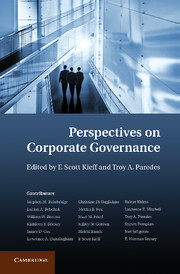Book contents
- Frontmatter
- Contents
- Contributors
- Acknowledgments and Dedication
- PERSPECTIVES ON CORPORATE GOVERNANCE
- Introduction
- PART ONE THE BOARD OF DIRECTORS AND THE CEO
- 1 The Trouble with Boards
- 2 Rediscovering Board Expertise: Legal Implications of the Empirical Literature
- 3 The CEO and the Board: On CEO Overconfidence and Institutionalizing Dissent in Firms
- PART TWO THE WHY, WHEN, HOW, AND HOW MUCH OF EXECUTIVE PAY
- PART THREE CONSTRAINING MANAGERS AND DIRECTORS: INVESTORS, SECURITIES REGULATION, AND THE MEDIA
- PART FOUR DELAWARE VERSUS CONGRESS: ON THE FEDERALIZATION OF CORPORATE GOVERNANCE
- PART FIVE COMPARATIVE CORPORATE GOVERNANCE
- Epilogue: Three Secular Trends of Corporate Law
- Index
- References
1 - The Trouble with Boards
Published online by Cambridge University Press: 04 August 2010
- Frontmatter
- Contents
- Contributors
- Acknowledgments and Dedication
- PERSPECTIVES ON CORPORATE GOVERNANCE
- Introduction
- PART ONE THE BOARD OF DIRECTORS AND THE CEO
- 1 The Trouble with Boards
- 2 Rediscovering Board Expertise: Legal Implications of the Empirical Literature
- 3 The CEO and the Board: On CEO Overconfidence and Institutionalizing Dissent in Firms
- PART TWO THE WHY, WHEN, HOW, AND HOW MUCH OF EXECUTIVE PAY
- PART THREE CONSTRAINING MANAGERS AND DIRECTORS: INVESTORS, SECURITIES REGULATION, AND THE MEDIA
- PART FOUR DELAWARE VERSUS CONGRESS: ON THE FEDERALIZATION OF CORPORATE GOVERNANCE
- PART FIVE COMPARATIVE CORPORATE GOVERNANCE
- Epilogue: Three Secular Trends of Corporate Law
- Index
- References
Summary
On Tuesday afternoon, December 2, 1913, Thomas W. Lamont and Louis D. Brandeis met for a three-hour luncheon at the University Club in New York. The famous Pujo Committee hearings had reached their controversial end, convincing many Americans that the accusations of Brandeis and others as to the existence of a Money Trust were right. The Money Tust appeared as a small group of mostly New York bankers centered on the House of Morgan. It allegedly controlled corporate America and its access to capital by placing its members on the boards of many of the nation's largest corporations.
Lamont was a relatively new partner of J. P. Morgan and Co. Like his partners, he served as a director of a number of corporations in which interlocking bank directorates had been exposed by the Pujo investigations. Within just a few years, he would take effective leadership of the Morgan firm and become perhaps the most prominent financier of his generation.
The conversation was polite, as befitted both the setting and the character of the two men. Needless to say, they disagreed about much. The most interesting turn in the conversation came during Brandeis's remarks about the potential conflicts of interest created by the fact that many of the same men sat on the boards of competing corporations. Passing the point in complete disagreement with Lamont's response, Brandeis took a different tack, questioning Lamont as to the sheer physical ability of Morgan's men to do their work as directors:
ldb: Take your own house alone.[…]
- Type
- Chapter
- Information
- Perspectives on Corporate Governance , pp. 17 - 61Publisher: Cambridge University PressPrint publication year: 2010
References
- 2
- Cited by



